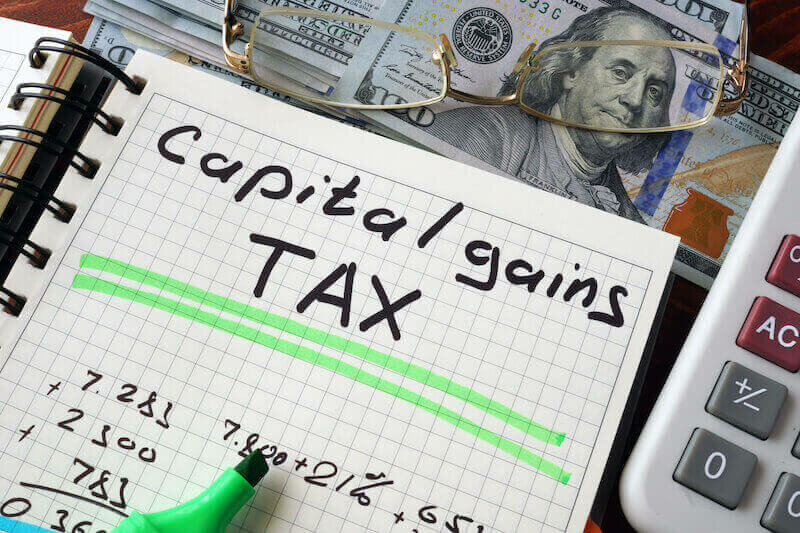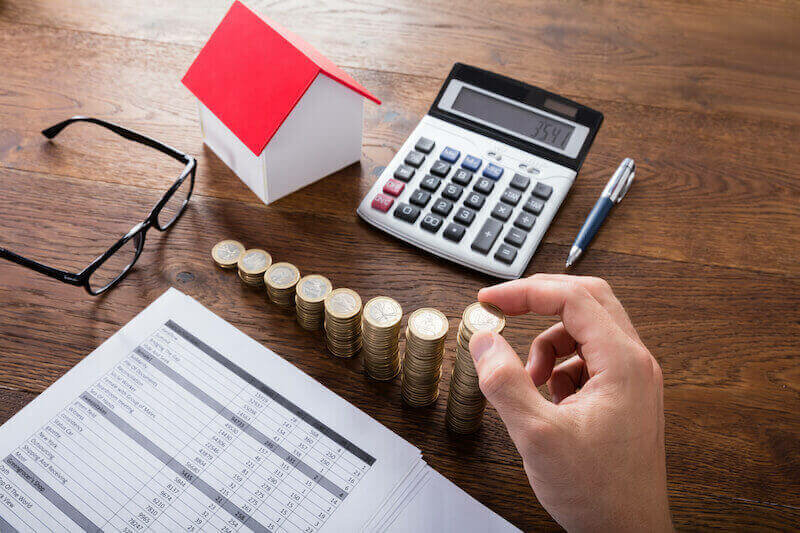Hearing the word taxes usually gives people an uneasy feeling unless you’re on the receiving end and tend to get a refund every year. Besides annual taxes or even quarterly taxes, there is a tax for any profits made from the sale of a capital gain. This could affect you when you go to sell your biggest asset, your Utah home. But what is capital gains tax? How does capital gains tax work? How much are capital gains taxes in Utah? And are there any strategies to be aware of to get out of paying capital gains? All are great questions to ask and get answers to if you’re preparing to sell your Utah property for a profit. We’ll cover all you need to know about capital gains so you won’t be surprised when Uncle Sam comes knocking.
What You Need To Know About Capitan Gains Tax In Utah

What is Capital Gains Tax?
To start with the basics, what is capital gains tax anyway? If you are not familiar with this particular tax, you’re not alone. Or maybe you are from selling stocks, bonds, jewelry, art, or a coin collection. Yes, capital gains tax applies to those items, too, not just real estate.
To explain this, simply a capital gain is the profits made from the sale of an asset. So, for example, you purchased your Utah home in 1992 for $70,000 and decided to sell it in 2021, and someone purchases the property for $450,000. You have made a capital gain of $380,000. The math would look like this: $450,000 (sale price) – $70,000 (purchase price) = $380,000 (capital gain profit). The capital gains tax applies to the capital gain profits from the sale of an asset, which in this case, we’re talking about a house.
Before you get too discouraged, though, there are tax exclusions that may apply to you, which will be explained more below.
How Does Capital Gain Tax Works?
So before you start to think the worst, that you will owe the government a lot of money upon the sale of your property, let’s look at how capital gains tax works. The first thing to know is that capital gains fall into two categories: short-term capital gains and long-term capital gains.
Short-term capital gains are defined as owning a home for less than a year and then selling it for a profit. If you have a short-term capital gain, it will be taxed at the regular income tax rates.
Long-term capital gains apply if you’ve owned the property for over a year and decided to sell for a profit. Then the capital gains you owe will fall into one of three tax brackets (0%,15%, 20%). The percentage you pay on your capital gains depends on your filing status (single or joint) and how much money you made last year. The good news is long-term capital gain tax rates are much lower than the short term tax rates for ordinary income.
Keep in mind that these are the federal capital gains tax rates; you will also need to set aside some cash for state capital gains taxes too.
How Much is Capital Gains Tax Rate in Utah?
Yes, you heard that correctly; you would also need to pay a local state capital tax as well. The capital gains tax rate in Utah for 2021 is 4.95%. The good news is that Utah’s tax rate is lower than other states. However, it’s another expense you’ll need to be aware of when you go to sell your Utah property and stand to make a profit.
For more help calculating your capital gains, check out this helpful calculator.
Other Capital Gains Tax Strategies To Remember
Ok, so now that you know there is a chance you’re going to owe some money on capital gains, you’ll want to find out if you are subject to some of the exclusions. The good news is if the home is your primary residence, you won’t have to pay up to $250,000 ($500,000 for married couples filing jointly) in capital gains upon the sale of your home if you meet these three conditions:
- You’ve lived in the house for the last two years before selling. You can deduct capital gains on your primary residence. You must live in your home for a minimum of two years out of the last five years of ownership before you sell to qualify for an exemption. Furthermore, the years you lived in the residence do not have to be consecutive.
- You’ve owned your home for at least two years. You need to have owned the place for at least two years before you can claim an exception. If you have not owned the property for a minimum of two years, you’ll be paying at the much more expensive short-term tax rates.
- You haven’t claimed another exemption recently. To qualify for this exclusion, you can’t claim another exemption if you’ve already claimed one during the last two years.
If you meet all three conditions above, you can exclude some or all of the capital gains tax when you sell the home.
However, this exemption only applies to your primary residence. If you were to sell a vacation home or investment property to anyone, including family, you would have to pay full capital gains taxes. It’s important to be aware of investment property taxes you could be held responsible for.
There are several other capital gains tax strategies you can look into to see if you would benefit. Here are a few different ways you can reduce the amount you’ll pay in capital gains.
Tax Strategy #1 Make Improvements
If you improve your primary residence, the cost of those renovations may be added to your home’s initial basis, which can potentially reduce your capital gains when you sell the house. However, these “improvements” can’t be normal wear and tear fixes. This usually means updating a kitchen, bathroom, adding square footage, or a swimming pool. These are things that are costly upgrades to the home and usually are considered. We’re not talking about fixing termite damage, a leaky roof, or making foundation repairs.
Since you’re planning to sell your home, making improvements may prove to be helpful. However, making updates to your home is not a guarantee that your house will sell faster or that you get back the return on your investment. Even if you have excellent negotiating skills and your home is in mint condition, there still is a chance you won’t get the price you want.
→ Need to sell your house fast in Utah? Check out this helpful guide by clicking here.
Tax Strategy #2 Reduce Your Overall Taxable Income
Since the capital gains tax rate can increase from 15% to 20% when your income is above the lower rate threshold, it may help to reduce your taxable income by making pre-tax contributions. Here are some ways you can do that:
- Employee-sponsored or individual 401(k) plan
- Traditional IRA
- 403 (b) plan
- 457 plan
- 529 plan (college savings plan)
- Health savings accounts
- Flexible spending accounts
Tax Strategy #3 Sell When Your Income is Low
If you’re about to retire or were just laid off from your job, it may be an excellent time to sell your home. Remember, your tax rate is based on your income, which means a lower income may translate to a lower capital gains tax.

Tax Strategy #4 When In Doubt Talk to An Expert
If you’re still confused about what strategies you should use, what exclusions apply to you, or even if you’ll owe capital gains tax speak to a skilled Utah CPA. They will be able to review your situation and income sources to determine the best strategy to reduce your tax liability.
Conclusion
The last thing you want to think about when selling a house is paying capital gains taxes, but it’s good to know the true cost of selling a home in Utah. If you do owe something towards capital gains, you’ll have to add that to the other expenses you’ll have to pay when selling your home.
Depending on your selling strategy, you’ll need to pay realtor commissions, which can add up to 5-6% (sellers agent and buyers agent commissions), property taxes, and closing costs. That doesn’t include any repairs around the house that might need to be made, like installing a new HVAC or roof. Total these expenses can cost several thousand dollars alone, not including what you may owe in capital gains taxes.
If you’re looking for ways to save money upon the sale of your home, you can always work with a local home buying company like CashQuickBuyers. CashQuickBuyers is a husband and wife duo that purchases houses all across Utah.
Their home buying process is different from traditional home sales and wouldn’t require you to list your home, complete costly repairs, or pay expensive realtor commissions. You would be able to sell your house as-is and close within 7-14 days. Besides not charging you agent commissions, they don’t charge service fees and even help pay closing costs. This is a great selling solution whether you owe capital gains taxes or not.
If you’re trying to sell a house fast in Salt Lake City or surrounding areas in Utah and would prefer to avoid the hassle of a traditional home sale and months of uncertainty waiting for your house to sell, contact CashQuickBuyers for a cash offer on your home today.
CashQuickBuyers is a BBB accredited business with an A- rating and a 5-star Google rating. For more information about the company or how they calculate a cash offer for your home, visit their website for more details or give them a call. They would be happy to answer any FAQ’s you may have.
